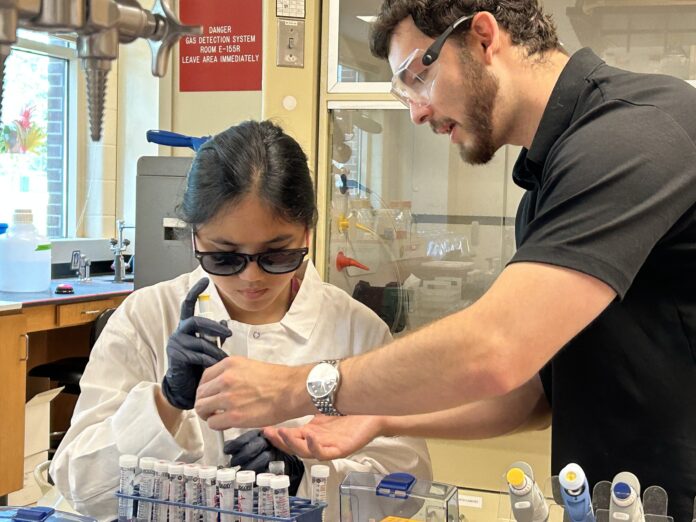
By Sarah Gallaher | Staff Writer
The hands-on, interactive nature of labs may cause many to assume that blind or visually impaired students cannot participate. However, Dr. Bryan Shaw, a chemistry and biochemistry professor, is proving them wrong through his efforts to make labs accessible for all.
“Our lab works to make both parts of science accessible to people with physical disabilities, including blindness,” Shaw said. “The first part is the data. We want to make the data accessible — all the imagery, all the pictures, all the graphs. … The second part is making the lab accessible with experimental tools and methods, and that’s the part where we need decades more work.”
Shaw’s research program, called The Shaw Research Group, received a $1.3 million grant from the National Institutes of Health to further its mission of making labs accessible to the blind and visually impaired. According to Shaw, the grant allowed him to host a two-day event last month for students from the Texas School for the Blind and Visually Impaired.
The event, titled “In Your Element,” taught high school students about the basic elements of chemistry and biochemistry. The 10 students spent one day working at the Texas School for the Blind and Visually Impaired in Austin and one day here at Baylor, where Shaw and other professionals mentored them.
“The coolest part of the event though was that we brought in Ph.D. mentors with blindness,” Shaw said. “We had three people here who have Ph.D.s in chemistry who are blind. Two of them are completely blind, and one of them is legally blind.”
Shaw said he began his research on accessibility for the blind and visually impaired after meeting a child who was blind at a birthday party. The encounter, coupled with the fact that Shaw’s son is also visually impaired, prompted him to imagine a future where these children could be scientists.
Shaw started researching methods to make labs more accessible to students with disabilities, and the research has paid off. At the “In Your Element” event, blind students, with the help of mentors and a special device created by a Baylor student, were able to complete a task that Shaw formerly deemed virtually impossible for blind and visually impaired students to do.
“It was the first time ever, that we know of, that blind high schoolers loaded an SDS-PAGE gel,” Shaw said. “We had tested the device out on one other person with blindness before these kids arrived, and he was able to use it effectively too.”
It does not require visibility to be safe in the lab, Shaw said. Students were able to safely conduct the lab and accurately analyze the data samples with the help of the device.
Shaw works to accommodate blind and visually impaired students in the classroom, but the Office of Access and Learning Accommodation also helps counter accessibility issues in a variety of ways.
Trevor Allison, senior accommodations specialist for OALA, said the office appoints student assistants to help those with physical disabilities at Baylor. The student assistants complete a variety of tasks, including note-taking, translation and audio descriptions.
However, Allison said needs vary depending on the student and the course requirements, so OALA fills the gaps as needed.
“Sometimes the students and faculty work it out between themselves. Sometimes we aren’t involved; sometimes we are involved. It just kind of depends on the exact scenario, the chain of communication,” Allison said. “We always tell faculty in our communications with them that we are always happy to additionally discuss accommodations and arrangements in their course and to help them provide an accommodating classroom experience.”
According to the OALA website, “OALA provides services and accommodations to meet the varying needs of students with disabilities at Baylor in both academic and non-academic programs and services.” However, the unique provisions needed to make lab work accessible to students with disabilities mean that complete accommodation is an ongoing process.
“I think that Baylor is doing generally a good job … at this point, through efforts in our office and efforts with Dr. Shaw, who we’ve worked with on a few things as far as what he’s doing in his lab,” Allison said. “And he’s helped us out with some accessibility things too.”
Although progress has been made regarding accessibility, Shaw said there is still more that can be done, particularly regarding the lack of government funding that blind or visually impaired students attending private schools receive. He said he hopes these students will be able to get the support necessary to attend private institutions like Baylor.
“It’s likely that we’ll start getting more of these students with blindness attending Baylor, and so we need to set up a system that can help make everything in the classroom accessible,” Shaw said.





